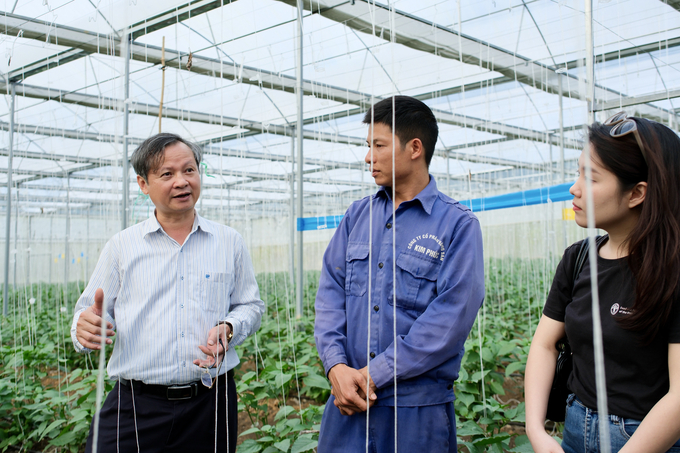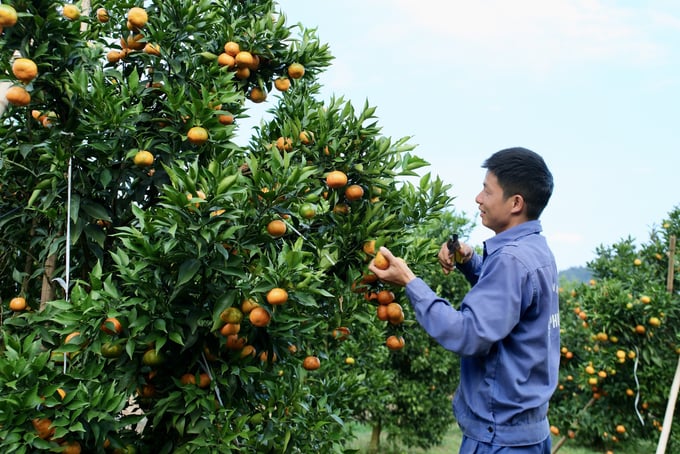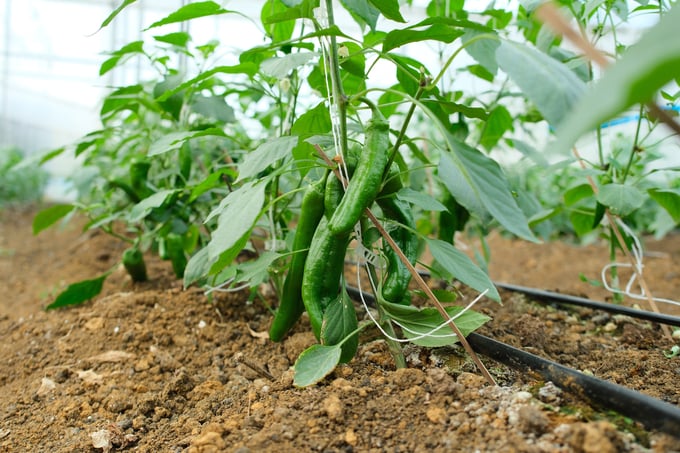May 20, 2025 | 10:30 GMT +7
May 20, 2025 | 10:30 GMT +7
Hotline: 0913.378.918
May 20, 2025 | 10:30 GMT +7
Hotline: 0913.378.918
In Moc Chau district (Son La province), the Fruit and Vegetable Research Institute (FAVRI) has worked closely with the Food and Agriculture Organization of the United Nations (FAO) to support farmers through the “Smart Agriculture for Future Generations” project since 2021. As a result, what were once scattered individual gardens have now transformed into a concentrated vegetable production area under greenhouses, supplying products to Hanoi and surrounding provinces and cities.

Nguyen Quoc Hung, Director of the Fruit and Vegetable Research Institute (left), has confidence in the ability of Son La farmers to access high-tech solutions. Photo: Quynh Chi.
The smart agriculture project is funded by the Korean Government and extends to both Vietnam and Uzbekistan. While greenhouse areas in Uzbekistan typically range from 300 to 500m2, in Vietnam, the Fruit and Vegetable Research Institute has proactively worked with the FAO to secure investment for much larger greenhouses, ranging from 1,500 to 2,000m2.
Discussing the project, Dr. Nguyen Quoc Hung, Director of the FAVRI, explained that the decision to invest in larger-scale greenhouses is not just strategic but also based on the actual capacity and needs of the farmers in Moc Chau.
Dr. Hung noted that international experts initially believed Moc Chau farmers would struggle to access and effectively implement new technology on a large scale. However, after years of collaborating on international projects with the Institute, local farmers have become well-acquainted with high-tech vegetable production techniques. Today, Moc Chau is showing signs of a concentrated vegetable-growing area.
“Moc Chau farmers are ready to innovate. They have the ability to adopt smart agriculture to enhance production efficiency,” Dr. Hung affirmed. He further explained that if the investment is limited to small greenhouses, the economic returns will be low, and the profits will not be attractive enough to encourage widespread participation in the project. He emphasized that what farmers truly need are modern technologies and production techniques, as these are the keys to developing an effective and sustainable concentrated production area.

Son La farmers have sufficient experience and knowledge to transition to high-tech crop production. Photo: Quynh Chi.
At the same time, small-scale farming cannot meet the goal of creating concentrated, commodity-oriented production areas. In this context, a model for safe vegetable production in large greenhouses is essential, requiring investment in integrated equipment and the identification of suitable distribution channels.
After a period of negotiation, international experts and officials gradually recognized the value of this plan and agreed to adjust the investment strategy, opening up new opportunities for Moc Chau farmers. As a result, large-scale production households participating in the project have already achieved significantly higher efficiency.
In previous years, Son La farmers primarily relied on the large land area and traditional farming methods. However, as agricultural land gradually becomes more limited, smart agriculture is becoming an inevitable direction for boosting productivity, optimizing growing spaces, and reducing environmental impact.
Reflecting on the three-year journey of the project’s implementation, Associate Professor Dr. Nguyen Quoc Hung noted that applying high technology in greenhouses has helped manage nutrition and pest control more effectively, resulting in safe vegetable products with stable quality.

Growing sweet palermo peppers in greenhouses shows good prospects, with stable plant growth. Photo: Quynh Chi.
Producing vegetables in greenhouses also offers many significant benefits, thanks to the ability to control environmental factors such as temperature and light. Specifically, when light intensity becomes too high, farmers are trained to use sun-blocking nets to protect their crops. Additionally, pest control equipment is installed in the greenhouses by project staff to prevent pest infestations during the wet rainy season.
Dr. Nguyen Quoc Hung emphasized, “A key factor in the success of the project is the harmonious combination of domestic technologies and technical advancements from international experts. These solutions have been tailored to suit the natural conditions of Moc Chau, helping to optimize production efficiency.”
Translated by Quynh Chi

(VAN) Vietnam aims to become a 'leader' in the region in the capacity and managing effectively soil health and crop nutrition.
![Reducing emissions from rice fields: [Part 1] Farming clean rice together](https://t.ex-cdn.com/nongnghiepmoitruong.vn/608w/files/news/2025/05/05/z6509661417740_a647202949c539012a959e841c03e1d3-nongnghiep-143611.jpg)
(VAN) Growing clean rice helps reduce environmental pollution while increasing income, allowing farmers to feel secure in production and remain committed to their fields for the long term.
/2025/05/19/5136-1-144800_230.jpg)
(VAN) The Nghe An Provincial People's Committee has just approved the list of beneficiaries eligible for revenue from the Emission Reductions Payment Agreement (ERPA) in the North Central region for the year 2025.

(VAN) 14 out of 35 domesticated elephants in Dak Lak province have had their living conditions improved, with 11 of them currently participating in the non-riding elephant tourism model.

(VAN) Muong Nhe Nature Reserve hopes that being upgraded to a national park will lay the foundation for forest protection efforts to be carried out in a systematic, modern, and sustainable manner.
/2025/05/16/3923-2-171845_52.jpg)
(VAN) Lower costs, higher yields, and improved soil quality are outstanding benefits that soybeans bring when integrated into the crop rotation system.

(VAN) The 'For a Green National Environment' programme aims to promote a green lifestyle, support businesses in implementing ESG practices, and turn Net Zero commitments into concrete actions.